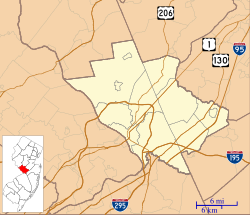History
When Mahlon Stacy and other Quakers arrived in the area in 1679, Trenton was known as "The Falls." Stacy was instrumental in establishing the Chesterfield Monthly Meeting in 1684, which included friends from Crosswicks and Trenton. In 1686, Quakers in what became Trenton organized the first local charity, which assisted friends who had met with misfortune. Stacy contributed corn from his mill, which gave the Mill Hill area its name. After William Trent purchased land from the Stacy family in 1714, the town was called Trent's-town, sometimes Trent-town, and finally Trenton. [6]
In 1827, the Society of Friends in the United States divided into two major branches, one known as Orthodox or conservative, the other known as Liberal or Hicksite, after Elias Hicks. The meeting house at Hanover and Montgomery Streets in Trenton, finished in 1739, was retained by the Hicksites. The Orthodox Friends, who had been meeting in homes, started building the brick meeting house at 151 Mercer Street in 1857 and completed it in 1858.
The graveyard was always an attraction for energetic young people, and in 1917, The Sunday Times Advertiser printed the reminiscences of Howell Quigley, who remembered being one of a gang of Third Ward boys, the "turn-cap-follow-me clique," who, "on their run through the neighborhood, across the fences and yards" would disturb the sanctity of the Quaker Church lot...even climbing onto the roof of the building, in and out of the barns, over the sheds, into cellars, anywhere, everywhere, and, oh, the dare of the leaders." Another commentator from 1917 grumbled, "I wouldn’t give a two-year-old bull for the best boy ever raised on Mill Hill," a view disputed by Mr. Quigley who became one of the proprietors of the printing firm of MacCrellish & Quigley and maintained his home on Jackson Street in the Mill Hill area, where he had lived from boyhood. [7]
In 1955, the Philadelphia Orthodox and Hicksite Friends reunited and in 1957, the Chesterfield Monthly Meeting authorized the renovation and use of the meeting house on Mercer Street for activities that would express "Friends social concerns. [8]
This page is based on this
Wikipedia article Text is available under the
CC BY-SA 4.0 license; additional terms may apply.
Images, videos and audio are available under their respective licenses.



